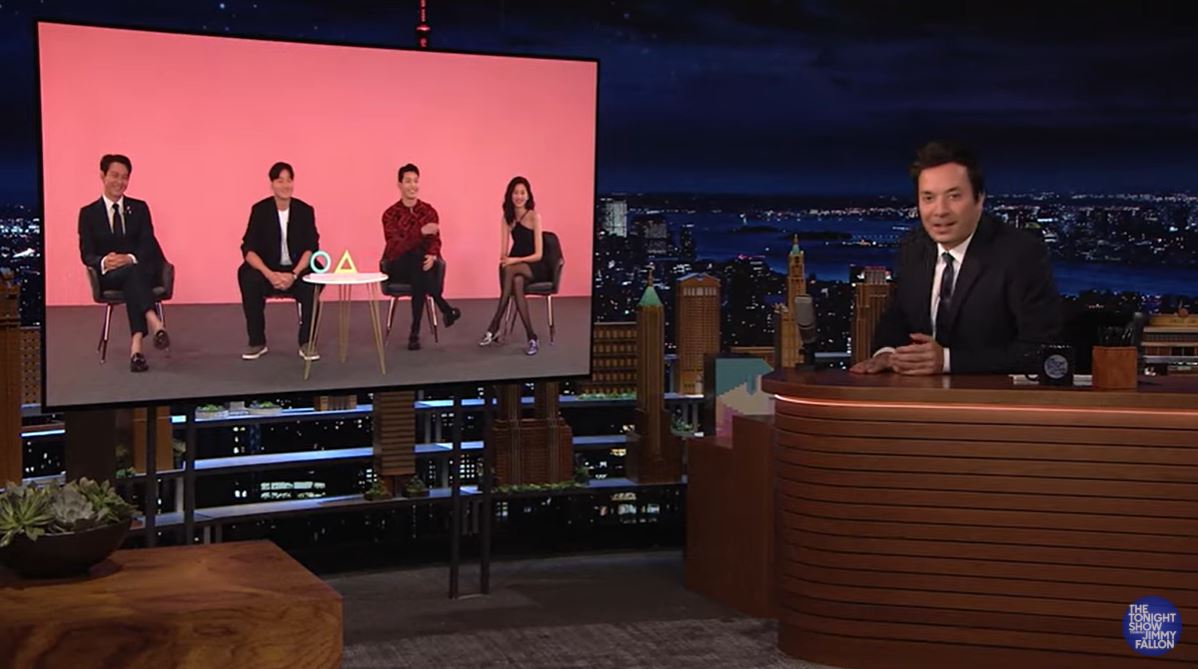Squid Game: The Tonight Show and the Subtitle Debate



Squid Game is the biggest show in the world, a surprise hit for Netflix, and an even bigger win for the South Korean entertainment system. For many, this is their introduction to the storytelling and production value happening in SK which is just as sophisticated as what they’re doing in Hollywood and other entertainment hubs, if not more.
Last night four cast members from the show, Lee Jung-jae, Park Hae-soo, Jung Ho-yeon, and Wi Ha-jun, were guests on The Tonight Show Starring Jimmy Fallon, on remote from Seoul. You know what headline got me so excited? Bethy Squires, writing for Vulture, said of Squid Game that “the monoculture is back”.
The monoculture is back, and once again, The Tonight Show is at its gooey center https://t.co/HXZjQk33yS
— Vulture (@vulture) October 7, 2021
With so many streaming options these days, and so many ways to consume content, it’s rare that so many people are all about one thing. We talked a lot about monoculture during the final episodes of Game of Thrones, when it was like there was a collective investment in the same show. At the same time… who is “so many people”, and is monoculture defined by those “people”? And must monoculture always originate from the “people” who determine its monoculture status? Not all of those questions are solved by Squid Game, but some of them are.
The fact that the series is even being suggested to be monoculture, a show with all Korean leads, spoken predominantly in Korean, with certain character and story details that are specifically Korean, is awesome. To me this is awesome. That said, those specifically Korean character and story details have become a conversation unto themselves.
You may have read about the dubbing and subtitling issues. There have been criticisms about some of the subtitles, that they don’t quite capture the nuance of the narrative, the cleverness of the writer. I’ve gotten some questions about that too, with people asking whether or not they should watch the dubbed version on Netflix or the subtitled. I never watch the dub, I am a subtitles person, even for programming in English. I watch everything with subtitles – so much that when I happen to put on something without subtitles, like a live event, I feel like something is missing.
As many people have suggested, where Squid Game is concerned, don’t do the closed caption subtitles, choose the subtitle option without the CC. Those seem to be more accurate, although still far from perfect. And there’s now an interesting debate about how the process can be perfected and what the challenges have been. NBC just published a piece yesterday with “translators weighing in on the debate” and it’s super interesting and informative, about the work of translators in general.
There’s no solution yet, but at the risk of sounding Pollyanna, the fact that this debate is happening at all is a step in the right direction. Because this is about how the industry has to adjust to popular content that comes from different cultures – and the audience is driving this change. This is a disruption to the entertainment production process, a new way of optimising content delivery to make sure that it’s appreciated in its intended form. In other words, it’s an exciting time of evolution…as slow as evolution sometimes can be.
And still, when Crazy Rich Asians came out, there were a lot of small details in that film and also more recently in Shang-Chi that wasn’t necessarily in the spoken language that could have only been appreciative by those with Chinese backgrounds. I remember that it made a difference for my experience but at the same time it didn’t mean that the experience wasn’t enjoyable for those who aren’t Chinese. That’s the great thing about universal specificity. There’s something for everyone. So to those of you who are worried that you might not be getting the full picture with the subtitles in Squid Game – the series will still be compelling, there’s still a lot to think about, you can still participate! And then you can go back and do the reading and learn more. Nobody loses!
Netflix has so far not commented on the subtitle issue but to their credit, they often work on things on the backend without announcing it. I know this because I watch a lot of Chinese and Korean programming on Netflix, and I rewatch a lot of it too, especially with rom-coms, and what I’ve noticed is that the subtitles often change. They’re minor tweaks, but they do make a difference. And I wouldn’t be surprised if the Squid Game subtitles end up getting adjusted, if they haven’t been already.

